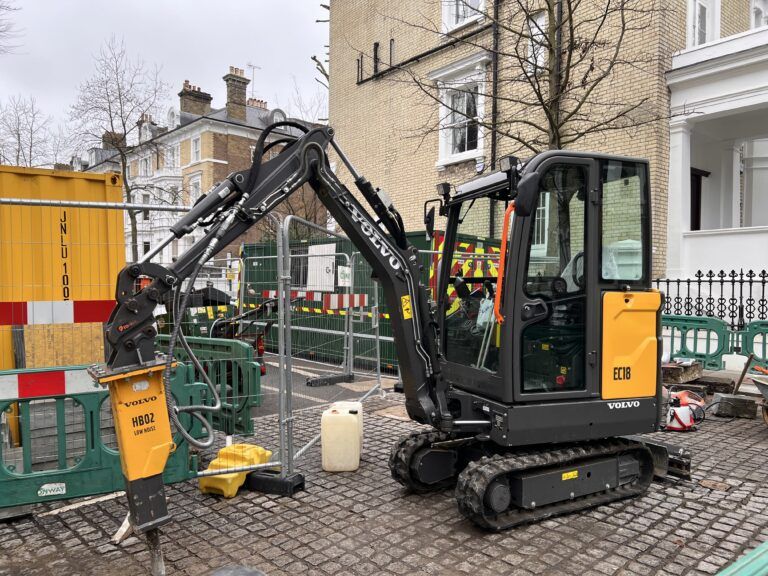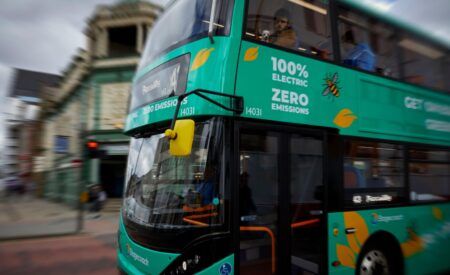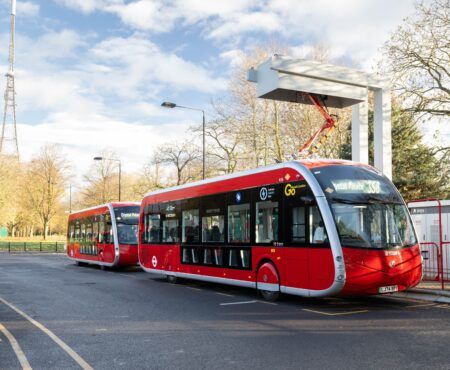Transport for London (TfL) is working with the construction industry on a new trial of zero emission construction vehicles, which involves a UK first method of mobile recharging.
TfL and FM Conway (FMC) have partnered with Volvo Construction Equipment (Volvo CE) and SMT to deliver the trial, with an electric excavator and wheel loader replacing equipment traditionally powered by fossil fuels, a first for TfL.
New advances in technology such as those being trialled at the site could play a vital role in reaching the Mayor of London’s target for London to be net zero carbon by 2030.
The electric vehicles use a method of recharging provided by Charge Fairy, a British electric charging startup. They are able to provide real-time updates on the machines’ charging levels when on-site, which feeds into a team who can then send a charging van to the site. This method of bringing the charger to the vehicle allows the construction machines to be recharged in an hour. Developments in how vehicles on construction sites are powered and charged could revolutionise how the capital’s transport network is built, ensuring London is greener and healthier for all.
The works on three junctions at Redcliffe Gardens, over a longer 11-week period, will improve pedestrian safety by creating raised sections of road that slow traffic and make crossings safer for pedestrians, to complement reduced road speed limits. It will also improve bus stop accessibility by extending the pavement. TfL is committed to the Mayor’s Vision Zero goal to eliminate death and serious injury from the capital’s transport network by 2041.
Diesel construction excavators are responsible for emissions equivalent to more than 100,000 passenger cars. If these vehicles were to be replaced with zero-emissions alternatives, they could play an important role in making the capital cleaner and greener.
Early data from the trial confirms that in a two-week period, the electric excavator saved more than 100kg of CO2, equivalent to driving a car 600 kilometres.
Additional harmful pollutants were eliminated (e.g. NOx, particulate matter, non-methane hydrocarbons and carbon monoxide) when compared with a diesel excavator completing the same work.
The use of zero-emission electric vehicles demonstrates TfL’s commitment to reaching the Mayor of London’s target for London to be net zero carbon by 2030. The works specifically aim to reduce the environmental impact of construction, with the reusing of materials and the recycling of almost all concrete waste by FMC. Additional waste is taken and reused in future TfL projects to ensure minimal environmental impact.
“The health of everybody in London is central to our work, and we are determined to meet our 2030 net zero targets. That’s why I’m so pleased that we’re continuing to take these important steps to reduce emissions and protect air quality,” says Carl Eddleston, TfL’s director of network management and resilience. “The trial of electric construction vehicles at Redcliffe Gardens is such a vital part of achieving our goals, and our work with FM Conway, Volvo CE, and Charge Fairy shows how construction across our transport network can be environmentally conscious. We are going to review the trial results and carry on exploring the best ways to decarbonise our network construction chain.”
“Many Londoners may not realise that the smaller diesel construction machines they pass by every day are entirely exempt from emissions controls. This means they emit disproportionately high levels of harmful pollutants like NOx and particulate matter, contributing to poor air quality and posing serious public health risks,” adds Mats Bredborg, electrification leader for Volvo Construction Equipment. “That’s why initiatives like this are so important – bringing the industry together to deliver a fully operational, electric, zero-tailpipe-emission solution that helps create cleaner, healthier streets for London.”





